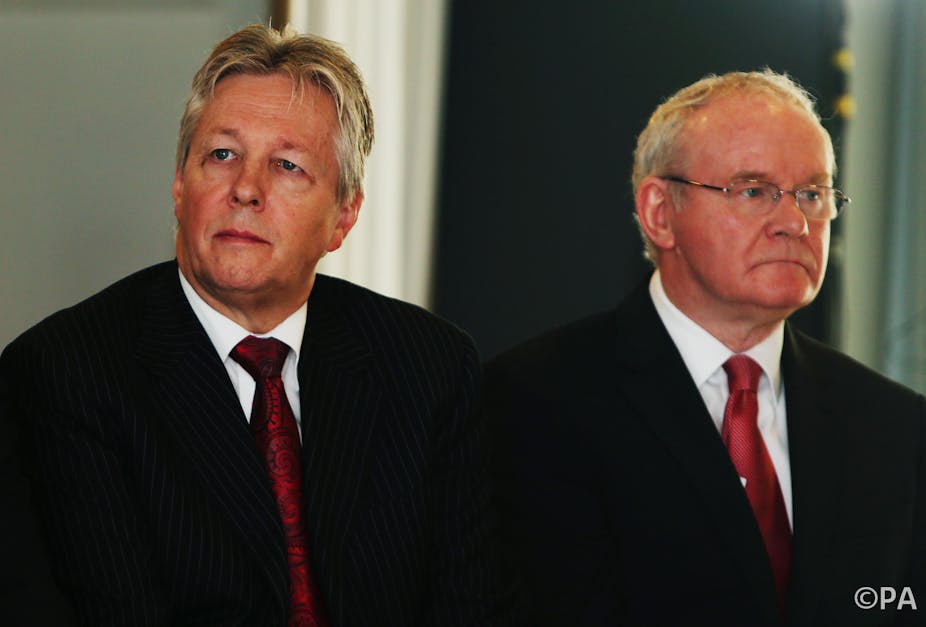It’s an all-too familiar scenario: the Northern Ireland Assembly in “crisis”, rocked by the latest high-profile scandal that sends elected representatives into meltdown, scrambling for superlatives to fully express their abhorrence.
Scurrying to their predictable tribal trenches, those in positions of political power (with their self-appointed monopoly on societal morality) leave many in Northern Ireland baffled, wondering if the stagnant tit-for-tat point-scoring will ever be replaced by calm and collected leadership.
This latest chapter in Northern Ireland’s more-often-than-not peaceful transition centres open the “controversial” revelation that accused IRA bomber John Downey will not stand trial for the Hyde Park atrocity, on the basis that he received prior correspondence from the UK government. The letter to him provided “a clear and unequivocal assurance” he was no longer wanted by the police in any UK jurisdiction.
In total, 187 such letters were sent to former Republican paramilitaries, those known as “On the Runs”, with the most recent posted in 2012 according to the attorney-general’s office. None were sent to Loyalists.
For some, despite Northern Ireland’s long period of unprecedented peace and stability, hindsight offers a chance to allocate blame. What should not be lost in translation or taken out of context is how necessary the agreement with regard to the “On the Runs” was: it allowed for the maintenance and expansion of peaceful stability and the safeguarding of our present day political institutions, so precariously placed and so readily criticised.

What representatives in the DUP and other disaffected Unionist politicians are calling underhand and deceitful dealings have in reality enshrined the peace, allowing for deeper democratic cross-party engagement. Gazing into the past often reveals cracks and flaws in any peace agreement – particularly since, by their very nature, peace agreements are hastily pulled together at times of uncertainty.
Hype and histrionics
The context of the society in which these decisions were taken that is forgotten with the passing of time. And what is lost in the media furore and political histrionics are the significant gains that were made as a result of guarantees like these. They offered us not just the prospect of a peaceful and stable Northern Ireland, but also the chance to bring former adversaries around the table to deliberate on matters that affect the people of Northern Ireland – and to provide a society devoid of most (if not all) paramilitary weaponry.
The DUP knows all too well that it was the issue of “On the Runs” which eventually led to effective IRA decommissioning in 2005. It is scurrilous to claim that had they known of these serendipitous guarantees they would have stayed clear; in reality, a failure to take this leap of faith could well have meant further disengagement with the ever-evolving political process.
Perhaps more importantly, to quote Peter Hain: “Such successes should not be whimsically disregarded by those who continue to play on the most basic fears of personal fairness or procedural injustice.”
It could be argued that the important thing about 1998 agreement is how far the Unionist “No” camp has come since, not the volume of concessions that had to be made at the time. Their rapid change of heart and subsequent engagement in the process should be commended, but they now ought to be warned of the need to avoid destabilising this peace – especially when it appears to the cynical eye to be nothing more than political posturing at a time of increased disillusionment among some Protestants, Loyalists and Unionists.
At best, this is an attempt by the DUP to save political face, warding off the annoying TUV that’s snapping at its heels. At worst, this is an example of playing with the emotions of victims. Either way, threats of resignation should be treated with caution, least we be held to ransom again by a party who have thrown their toys out of the political pram.
If the DUP is the petulant child, then the assembly should stand up and show some parental authority. While it may be a bridge too far to ask for individual reconciliation, we should at least enthusiastically demand that greater energy be focused on societal cohesion. Incidents like this remind us of the challenges associated with dealing with Northern Ireland’s murky past.
When presented alongside the recent failures of the Hass-O’Sullivan talks, directly aimed at resolving these issues, it becomes clear that ad hoc attempts to manage the past will only ever have a limited impact. The peace that has been achieved will be staunchly defended – but incidents like this remind us all of how fragile it really is.

